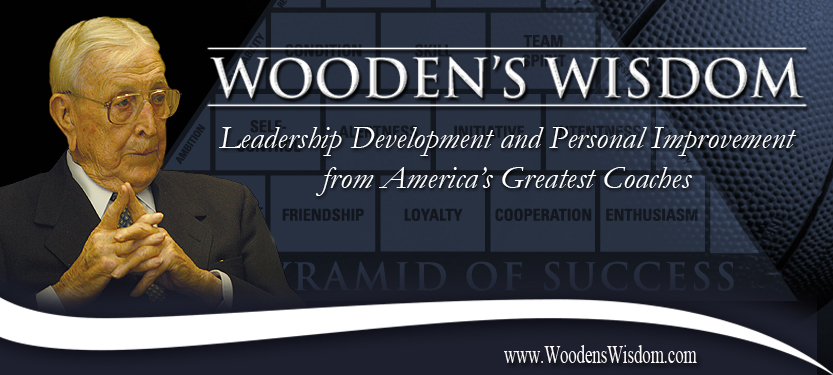 |
|
| Wooden's Wisdom - Volume 1 | Issue 39 |
| Craig Impelman Speaking | Championship Coaches | Champion's Leadership Library Login | |
|
The Coach as a Teacher - Part 1 (Teach by example - You haven't taught until they have learned.)
Coach Wooden established four essential components of being a successful coach: The Coach as a Philosopher, as an Example, as a Teacher, and as a Leader.
This issue will discuss the coach as a teacher.
An important characteristic of being an effective teacher is setting a good example. Consistent behavior provides an example. Consistent behavior can only be produced if we have a philosophy that governs our actions. Without a philosophy our actions will lack consistency because they will simply be reactions to the behaviors of others.
Coach’s philosophy, as discussed in our first thirty eight issues, guided his personal behavior. His behavior created the example that he set which was his greatest teaching tool as a coach. A favorite poem of Coach Wooden’s summarizes this idea:
No written word
Nor all the books
In his book Practical Modern Basketball Coach Wooden discussed the coach’s role as a teacher in the following manner:
Since the most important responsibility of a coach in regard to the actual playing of the game is to teach his players properly and effectively to execute the various fundamentals of the game, he is, first of all, a teacher.
Coach continued by explaining the “Laws of Learning”:
A fundamental must be explained and demonstrated, the correct demonstration must be imitated by the players, their demonstration must be constructively criticized and corrected, and then the players must repeat and repeat the execution of the proper model until the correct habit has been formed to the point where they will react instinctively in the correct manner.
The work environment following the laws of learning can be beneficial. Sometimes we hurriedly give a team member an assignment with a deadline and walk away. We are disappointed when the work product does not meet our expectations. I describe this delegation technique as "Drop and Run”. This methodology does not always produce desirable results.
Coach would caution us: "Be quick but don't hurry."
The first step in the laws of learning "explanation" is communicating to the team member the purpose of the task and sometimes how it fits in “the big picture”. This communication helps transform an employee into a team member. In the delegation/teaching process it is helpful to feed our team members the corporate breakfast of champions: "facilitate feedback". The simple question "What are your thoughts?" will further energize the team member as they begin to understand that they are truly working with you, not for you.
The steps of demonstration, imitation of demonstration and constructive criticism of the imitation are critical as they ensure that you and the team member are "both on the same page".
The extra five minutes you spend in following the laws of learning when assigning a task may seem like a lot in today's fast paced business environment.
The value of taking the extra time is encapsulated in one of Coach’s favorite quotes: "If you do not have the time to do it right, when will you have time to do it over?"
Confucius provided a student’s perspective with regards to the art of learning: "I hear and I forget. I see and I remember. I do and I understand."
As Coach liked to say: "You haven't taught until they have learned.”
Yours in coaching,
Craig Impelman www.woodenswisdom.com
Twitter: @woodenswisdom
|
THEY ASK ME WHY I TEACH
“They ask me why I teach
And I reply,
‘Where could I find
more splendid company?
There sits a statesman,
Strong, unbiased, wise,
Another later Webster,
Silver-tongued.
And there a doctor
Whose quick, steady hand
Can mend a bone,
Or stem the lifeblood's flow.
A builder sits beside him --
Upward rise
The arches of a church
he builds, wherein
That minister will speak
the word of God,
And lead a stumbling
soul to touch the Christ.
‘And all about
A lesser gathering
Of farmers, merchants,
teachers, laborers,
men who work and
vote and build
And plan and pray
nto a great tomorrow.’
And, I say,
"I may not see the church,
Or hear the word,
Or eat the food
Their hands will grow-
And yet -- I may.
And later I may say,
‘I knew the lad,
And he was strong
Or weak, or kind, or proud
Or bold, or gay.
I knew him once,
But then he was a boy.’
They ask me why I teach,
and I reply, ‘Where could I find
more splendid company?"
Glennice L. Harmon NEA Journal |
|
For more information visit www.woodenswisdom.com |
|
© Copyright 2026 WoodensWisdom.com | # of Times Wooden's Wisdom Issues Opened: 7,886,262
Hosting & Design by:EverydayWebDesign.com